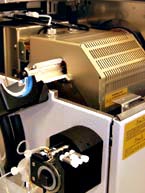| Isotope Geochemistry People Facilities Research Analytical Services Technical Notes Sites of interest |
 Mass Spectrometer: "There's got to be a
better way to make a living"
Research ProgramsRadiogenic Isotope Geochemistry Some current research projects:  "It behaves at times in a most capricious and
unaccountable manner...when by good fortune all is well the
arrangement is capable of good performance."
- F. W. Aston, speaking of his Mass Spectrometer The stable isotope ratios of light (H, C, O, N etc.) elements vary greatly in nature and we can use these variations to understand geological and biological processes. In particular, stable isotopes are potent tools for paleothermometry and climate change, fluid-rock interactions, tracing the hydrologic cycle, physiology, and ecosystem ecology. At the University of Texas at Austin, some of the research areas currently using stable isotopes are: groundwater and vadose zone hydrology, paleoclimatology, diagenesis, metamorphism, and ore genesis. Some current research projects: - Diagenesis of carbonate and siliciclastic sediments (Banner) - Origin of authigenic clays during burial diagenesis (Long) - Evolution of groundwater in Barbados, central Texas and midwestern US (Banner) - Genesis of ore-bearing fluids in porphyry copper and sediment-hosted systems (Kyle) - Climate variability as revealed by the geochemistry of marine sediments and coral reefs (Quinn)
|
|
|